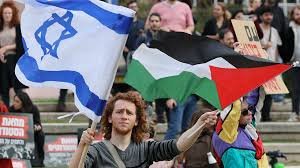The ongoing Israel-Palestine conflict has reached a critical point, with devastating consequences for the people of Palestine. The Israeli armed forces, in response to a Hamas attack, have launched a relentless onslaught that has continued for four months, resulting in the merciless massacre of women and children and leaving the entire population of the Gaza Strip homeless. Shockingly, nearly 25,000 Palestinians have lost their lives, and over 50,000 have suffered grave injuries as a result.
Amidst this humanitarian crisis, the Muslim world and the international community have failed to effectively address the situation and put an end to the genocide unfolding in Palestine. The silence of Arab nations and the backing of the Israeli government by the United States and the European Union have only emboldened Israel to expand the conflict further, with attacks in Lebanon and a disregard for the UN General Assembly’s resolution calling for an immediate ceasefire.
This article aims to shed light on the divisions within the Muslim world regarding the Israel-Palestine conflict. Despite being the second-largest Muslim country globally, Pakistan remains deeply concerned about the happenings in Gaza. Pakistan has consistently stood by the Palestinians since the establishment of Israel in 1948 and has yet to recognize the state of Israel, unlike many Arab nations.
The lack of unity and collective action among Muslim countries is evident as the bloodshed continues. With stark differences between them, these nations have shown little eagerness to intervene directly or indirectly to alleviate the suffering of Palestinians. However, Iran has taken the initiative by providing support to Hezbollah in Lebanon, Hamas in Gaza, and the Houthis in Yemen. Surprisingly, it was South Africa that had the courage to file a case against Israel in the International Court of Justice, accusing them of breaching the 1948 Genocide Convention.
While Arab and Muslim countries have condemned the Israeli forces’ actions in Gaza, they have failed to agree on joint action or impose economic and political sanctions against Israel. Even at recent summits, divisions were apparent in how to respond to the conflict, risking further regional instability. The need for practical measures to counter the Israeli offensive has been emphasized by Iran, while countries like Algeria and Lebanon have proposed disrupting oil supplies to Israel and severing economic and diplomatic ties. However, some nations, such as the United Arab Emirates and Bahrain, rejected these proposals, highlighting the lack of consensus.
Pakistan’s response to the conflict has been mixed, with calls for a more active role in mobilizing the international community to end the death and destruction in Gaza. While Pakistan has referred to the Israeli action as “genocide,” it has yet to join South Africa’s petition to the International Court of Justice. Clarity and coherence are needed in Pakistan’s policy on this issue, as some statements by the caretaker Prime Minister have raised concerns.
In conclusion, the Israel-Palestine conflict has exposed the divisions within the Muslim world, hindering effective action and leaving Palestinians vulnerable to continued suffering. Muslim nations must set aside their differences and unite in support of Palestine, while the international community must take concrete steps to address this humanitarian crisis and work towards a just and lasting solution to the conflict.







